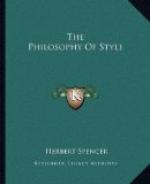iv. The Ideal Writer.
67. This species of composition which the law of effect points out as the perfect one, is the one which high genius tends naturally to produce. As we found that the kinds of sentences which are theoretically best, are those generally employed by superior minds, and by inferior minds when excitement has raised them; so, we shall find that the ideal form for a poem, essay, or fiction, is that which the ideal writer would evolve spontaneously. One in whom the powers of expression fully responded to the state of feeling, would unconsciously use that variety in the mode of presenting his thoughts, which Art demands. This constant employment of one species of phraseology, which all have now to strive against, implies an undeveloped faculty of language. To have a specific style is to be poor in speech. If we remember that, in the far past, men had only nouns and verbs to convey their ideas with, and that from then to now the growth has been towards a greater number of implements of thought, and consequently towards a greater complexity and variety in their combinations; we may infer that we are now, in our use of sentences, much what the primitive man was in his use of words; and that a continuance of the process that has hitherto gone on, must produce increasing heterogeneity in our modes of expression. As now, in a fine nature, the play of the features, the tones of the voice and its cadences, vary in harmony with every thought uttered; so, in one possessed of a fully developed power of speech, the mould in which each combination of words is cast will similarly vary with, and be appropriate to the sentiment.
68. That a perfectly endowed man must unconsciously write in all styles, we may infer from considering how styles originate. Why is Johnson pompous, Goldsmith simple? Why is one author abrupt, another rhythmical, another concise? Evidently in each case the habitual mode of utterance must depend upon the habitual balance of the nature. The predominant feelings have by use trained the intellect to represent them. But while long, though unconscious, discipline has made it do this efficiently, it remains from lack of practice, incapable of doing the same for the less active feelings; and when these are excited, the usual verbal forms undergo but slight modifications. Let the powers of speech be fully developed, however—let the ability of the intellect to utter the emotions be complete; and this fixity of style will disappear. The perfect writer will express himself as Junius, when in the Junius frame of mind; when he feels as Lamb felt, will use a like familiar speech; and will fall into the ruggedness of Carlyle when in a Carlylean mood. Now he will be rhythmical and now irregular; here his language will be plain and there ornate; sometimes his sentences will be balanced and at other times unsymmetrical; for a while there will be considerable sameness, and then again great variety. His mode




